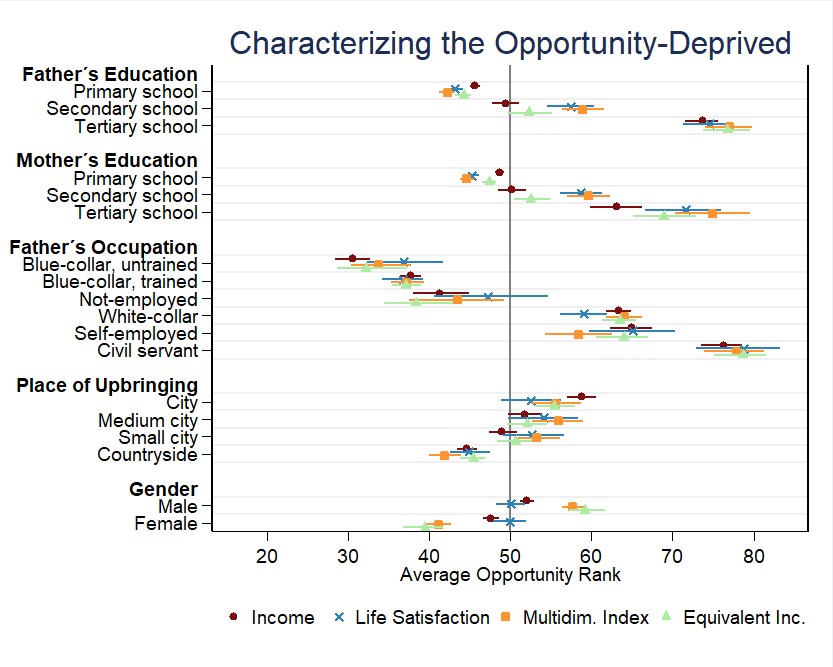 By Daniel Mahler and Xavi Ramos
By Daniel Mahler and Xavi Ramos
The notion that individuals ought to have equal opportunities in life is popular among politicians, the general public, and philosophers alike. It is deeply embodied in the American Dream and has resonated with politicians ranging from Margaret Thatcher to Nelson Mandela.
Although there is wide agreement on the objective of providing equal opportunities, it is not altogether clear what, exactly, there ought to be equal opportunities for. The last decade has seen a rising discussion about whether we should go ‘beyond GDP’ – beyond income – when measuring societal well-being. This very same discussion can be applied to providing equal opportunities. Should individuals have equal opportunities for acquiring income? Or is there more to individuals’ well-being than just income? These discussions are not purely of theoretical interest; evidence shows that the concept of well-being we employ matters for assessments of both poverty and welfare.
By now, a sizable number of empirical studies have been carried out analyzing the extent to which individuals have equal opportunities for income acquisition (see Ferreira & Peragine (2016) for an excellent recent review). In general, these studies measure opportunities by predicting individuals’ income based on a range of factors outside the realm of personal responsibility, such as individuals’ gender, birth area, and their parents’ education. These predictions can be thought of as the opportunities of individuals; individuals with a high predicted value come from a fortunate background with high chances of succeeding, and vice versa. Under this interpretation, inequality of opportunity can be calculated as the inequality in the predicted incomes.
However, if there is more to life than just income, perhaps we need to rethink – and re-measure – what we ought to provide equal opportunities for.
In a new IZA discussion paper, we set out to do just that on German data. Besides looking at whether individuals have equal opportunities for acquiring income, we utilize three other measures of well-being: A multidimensional index, life satisfaction, and equivalent incomes. Based on this, we look at whether trends in inequality of opportunity over time and a characterization of the most opportunity-deprived depend on what we want to equalize opportunities for.
To our surprise, it doesn’t.
To illustrate this, suppose we rank a population according to their opportunities for acquiring income. The ones standing furthest to the left have the lowest opportunities (the lowest predicted income), while the ones standing furthest to the right have the highest opportunities. We then ask everyone whose father only had primary education to take one step forward. The more to the left these people stand, the lower opportunities for acquiring income individuals with a low educated father have. We can re-rank the population according to their opportunities for having a high life satisfaction, once again ask the ones whose father had a low education to take one step forward, and see where they rank. If they stand approximately the same place as before, then fathers’ education plays the same role in predicting opportunities regardless of whether we want to equalize opportunities for income or for life satisfaction.
The figure below shows that individuals stand approximately the same place, regardless of which of our four well-being measures we utilize. This applies not only to fathers’ education, but also to a range of other factors outside the realm of personal responsibility. Individuals with low educated parents, individuals whose father was a blue-collar worker or unemployed, individuals who grew up on the countryside, and (for the most part) women, are always opportunity-deprived.

So why does the measure of well-being hardly matter for equality of opportunity, when previous studies have shown that how we measure well-being matters greatly in a range of other contexts? We believe the intuition is straightforward. Some people may have a high income but a low satisfaction with life, and vice versa. However, for any plausible account of well-being, we always expect individuals coming from a poor background with uneducated parents to have lower levels of well-being. Regardless of what we want to equalize opportunities for, the individuals with the lowest opportunities will, broadly speaking, be the same.
Perhaps this is good news. Whereas the debates about how to measure societal well-being are long and intricate, we may be able to sidestep this whole discussion if our policy objective is to provide equal opportunities.